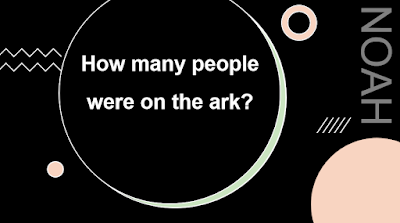The Whole Story
Welcome to the third lesson in our year series
through the Bible.
Read through Genesis 6-9
Six chapters into the Bible, things have
completely come off the rails. Adam’s descendants have not fared much better
than he and Eve. Cain was overcome with jealousy and killed his brother, Abel,
when God rejected his offering but looked with favor upon Abel’s offering
(Genesis 3:1-8). Read on, and you’ll find that Cain’s great grandson, Lamech,
thinks Cain is too soft (Genesis 3:24). This dysfunctional family leads us
directly to the time of Noah.
By the time we are introduced to Noah, we are
told that God has some serious “regrets” about creating mankind. That God is
“sorry” to have created man presents a series of deep theological questions.
However, rather than introduce theological speculation, the author of Genesis
intends to show just how far creation has fallen. In Genesis 1, God surveyed
his creation and saw that it was “very good.” Now, sin has so broken things, so
corrupted God’s design, that God looks upon the creation and feels not pride but
heartbreak.
A reset is needed. God’s sorrow moves Him to
hit the restart button. God’s plan for reset comes through judgment. In Genesis
6, we are told of God’s intention to start again by destroying and repopulating
the Earth through one righteous person, Noah.
Yes, God’s plan includes judgment, but amid judgment, there is
salvation. Noah is given instructions to build a boat, a big boat, and fill it
with the animals that populate the earth. Judgment and salvation.
The story of Noah. The story of the Bible.
The story of Noah is a familiar one. Despite the familiarity, read closely,
listen closely, and look closely; you’ll see more than Noah, the ark, and the
animals. You’ll see Jesus. Jesus is here even when it seems like all is lost.
Bottom Line:
God alone can redeem what we have broken.
God will do whatever it takes to make things right.
Sermon Recap
Genesis 6 introduces us to a sobering
reality: sin always results in the judgment of God. A righteous God cannot
allow unrighteousness to slide. Genesis 6-9 puts this reality on full display.
Noah is a picture of Christ long before
Christ ever came. A righteous man provides a way of salvation from the judgment
of God. Though, it isn’t long before we remember that Noah isn’t Christ; he
fails and falters just like we all do.
The good news of the gospel shines through in the story of judgment when we see the rainbow shine in the clouds. Here we have a reminder that though judgment is what we all deserve, we have a God who promises mercy.
Question: Share about a time when
you’ve experienced both discipline and grace in the same situation. How did it
shape your perspective?
Scripture
Genesis 6:5-9
5 The Lord saw that the wickedness of man was
great in the earth, and that every intention of the thoughts of his heart was
only evil continually. 6 And the Lord regretted that he had made man on the
earth, and it grieved him to his heart. 7 So the Lord said, “I will blot out
man whom I have created from the face of the land, man and animals and creeping
things and birds of the heavens, for I am sorry that I have made them.” 8 But
Noah found favor in the eyes of the Lord. 9 These are the generations of Noah.
Noah was a righteous man, blameless in his generation. Noah walked with God.
Discussion Questions
What set Noah apart from the rest of the people during his time, and how did his pursuit of righteousness lead to God using him for His purposes?
- Reference: Genesis 6:8-9 ("But Noah found favor in the eyes of the Lord... Noah was a righteous man, blameless in his generation. Noah walked with God.")
- Follow-up: How can we cultivate a similar walk with God in our own lives?
What does the flood teach us about God's judgment on sin, and how should that shape our understanding of His holiness?
- Reference: Genesis 6:5-7 ("The Lord saw that the wickedness of man was great in the earth... and the Lord regretted that He had made man on the earth, and it grieved Him to His heart.")
- Follow-up: How does God's judgment reveal His desire for holiness and justice?
How does the ark serve as a picture of God’s plan of redemption, and what parallels can we draw between the ark and salvation in Christ?
- Reference: Genesis 6:13-14; 7:16 ("Make yourself an ark of gopher wood... Then the Lord shut him in.")
- Follow-up: In what ways does Jesus offer us a place of safety and refuge from the judgment of sin?
How does God’s covenant with Noah after the flood reveal His mercy and faithfulness? What does this teach us about His commitment to redemption?
- Reference: Genesis 9:8-11 ("I establish my covenant with you... never again shall there be a flood to destroy the earth.")
- Follow-up: How can God’s faithfulness to His promises give us confidence in His redemptive plan today?
Noah’s obedience to God was costly and countercultural. How does his example challenge us to trust and obey God, even when it doesn’t make sense to the world?
- Reference: Genesis 6:22; 7:5 ("Noah did this; he did all that God commanded him.")
- Follow-up: What are practical ways we can trust God in difficult or uncertain circumstances?
Noah was faced with a massive test of faith.
Building an Ark may seem like a straightforward task, but such a calling was no
small feat. Answering God’s call took a lot of faith and a massive step of
obedience. What is God calling you to be obedient in? It may not be building an
ark, but we all have places where we are called to obedience.
END



































